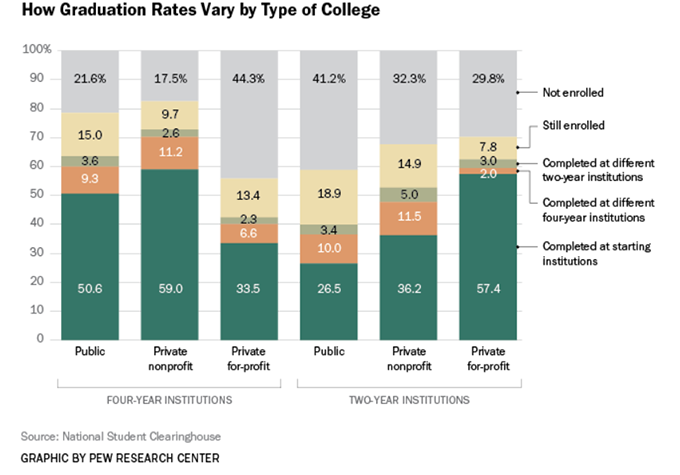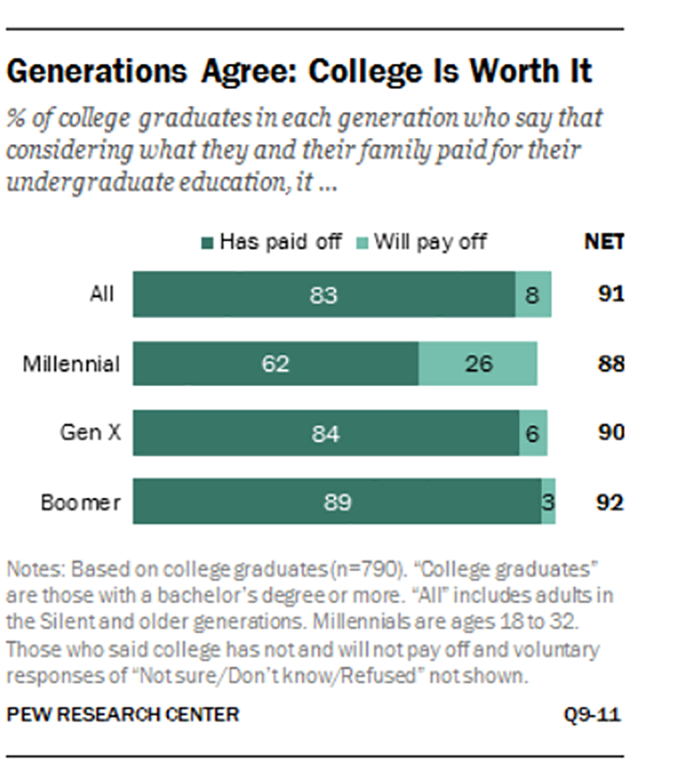
Apparently semesters go even faster when you’re not teaching, and graduation is coming up soon if not over for most college students. A 2014 article highlights the situation for graduates on our campuses, and I doubt much has changed in the last 5 years, so let’s get to it:
5 Facts About Today’s College Graduates
The article starts with a nice picture, which lists 6 year graduate rates (i.e., where students are in their education after 6 years), by school type:now some more facts:

Only about 56% of students earn degrees within six years.
To clarify: this is strictly referring to graduates. There’s much talk about worthless degrees, and it’s valid talk, but it overlooks the simple fact a very large percentage of students get absolutely nothing out of college but debt. The main reason for this is our schools have removed all entrance requirements in the quest to get every last student loan dollar.
…lowest (39.9%) among those who started at two-year public institutions.
I’m hard on state community colleges because time and again they are standout failures, in this case having the absolute lowest 6 year graduation rates—particularly abysmal considering these schools offer 2-year degrees.
The reason these types of schools are such failures is because they are built from the ground up with fraud in mind, with no care to the harm they do to our citizens. For-profits at least pass out degrees, generally worthless…but still more valuable than the “nothing” our state community colleges offer.
Business is still the most common major.
One of the main reasons so many college degrees are worthless is because they are so common now. My father, the first in my family to graduate college, had a business degree—he was a little ashamed of it, truth be told, but he did get it in a time when not everyone could get into college, much less get a degree.
Anyway, if you’re looking to get a degree with value due to scarcity, the article helpfully supplies the rarest degrees:
The least common bachelor’s degrees, according to the NCES, were in library science (95 conferred in 2011-12), military technologies and applied sciences (86) and precision production (37).
Ok, maybe library science isn’t so great an idea (libraries are sort-of on the way out thanks to the internet, which has also made encyclopedias little more than overpriced wallpaper/insulation). But do check out the others if the old standby for useful degrees, engineering, isn’t for you.
…about 44% of grads were working in jobs that didn’t require a college degree — a rate that, while about what it was in early 1990s, increased after the 2001 and 2007-09 recessions. Only 36% of that group were in what the researchers called “good non-college jobs” — those paying around $45,000 a year — down from around half in the 1990s. The share of underemployed recent grads in low-wage (below $25,000) jobs rose from about 15% in 1990 to more than 20%. About one-in-five (23%) underemployed recent grads were working part-time in 2011, up from 15% in 2000.
The above highlights the ultimate problem with today’s college degree system. Let’s just look at the best-case scenario, the 36% of 44% (i.e., 16% or so) who are making $45,000 a year. Sounds good, but they spent around 6 years getting that degree, and leave college $30,000 in debt on average.
They’re making more a year, supposedly, but factor in the 6 years of lost wages a janitor could have made (at $25,000 a year), the interest they’re paying on the student loan (another $2000 a year, perhaps), the taxes they pay on the higher income, and the janitor will have a higher net worth for at least a decade, quite possibly more. Because of compound interest, if the janitor can invest a little, he’ll probably be ahead of the “smart” college graduates until his 50s…and that’s assuming he doesn’t get a pay raise in his 20+ years of washing floors. Janitors also won’t spend as much time “between jobs”—no matter who owns the building, someone has to clean it up, after all. So even a graduate who gets a job with his degree might well lose a year or two of wages when between jobs.
And those are the lucky college graduates…
The final fact the article provides is that most grads think their degree was worth it but…this is misleading. I ask the gentle reader to consider this chart:

Seriously, how is the trend not noticeable? Yes, the drop in belief the degree is worth it is slight but steady…now look at that “hope” percentage. The millennials are clearly thinking their degrees will pay off, while the boomers and Gen Xers have already scored their gains. The issue is, the older generations went through a generally legit system…the millennials are hopeful, but are about to get a big dose of reality, as the higher education system of the 21st century is vastly more corrupt than what the previous two generations went through.
You want to bet Generation Z, born after the millennials, are already of the mind that a college degree isn’t worth it?
A short post, as I wrote this while in Houston, the grand center of all things cancer treatment, awaiting tomorrow’s appointment at Cancer Death Camp. I suspect I’ll be advised to do something very painful, involving months of misery, and with a low chance of success but that’s not any demonstration of psychic powers on my part, that’s what every treatment so far has been.
